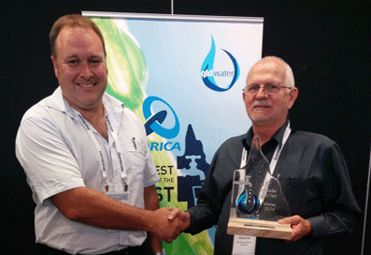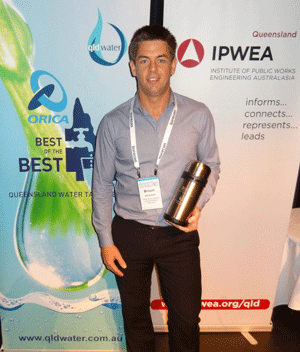Richmond wins best tasting tap water in Queensland!

Congratulations to Richmond Shire Council who has taken out the 2014 Orica Australia Best of the Best Queensland Water Taste Test at the IPWEA Queensland Conference in Caloundra last week. Water from its pilot plant was selected as the best tasting by conference delegates through some 440 individual tastes. Richmond Shire Council's Graeme Osbourne accepted the trophy from qldwater CEO, Dave Cameron.
The win will come as a great relief to Richmond residents whose town water supplies have always had a strong odour and stained their washing due to high levels of iron and manganese.
The new water treatment plant will be fully commissioned by December 2014 – the perfect Christmas present for the town!
As usual in the state finals, the results were very close and Richmond narrowly pipped Rockhampton to take the honours, with Bundaberg a close third.
Congratulations also to Brian Jackson from Local Government Infrastructure Services (pictured below) who won the Best Palate competition. Introduced in 2014, this competition requires delegates to match samples to sources and treatment processes – no mean feat when you are dealing with the best tasting water in the state!.

There are over 300 water supply schemes (or community water supplies) across the state, most of which are managed by local government. Thirty-two members competed in our regional finals held during the year with the following six regional winners fighting out the grand final:
South East Queensland
Bundaberg Regional Council’s Lovers Walk groundwater is drawn from the Elliott Formation consisting of a sand and gravel aquifer between 20 and 40 metres below ground level. The groundwater drawn from Lovers Walk is a very soft water free from impurities. The untreated groundwater is very “aggressive” water due to the high carbon dioxide content, low pH and alkalinity. The treatment process consists of the groundwater being pumped to an aeration spraybed, where excess carbon dioxide is removed. The aerated water then filters through a bed of limestone for pH correction and neutralisation prior to being gravity-fed to a collection chamber and then chlorinated on its way to a storage reservoir, and pumped to the reticulation system.
South West Queensland
Toowoomba Regional Council’s Mt Kynoch Water Treatment Plant takes water from Toowoomba’s three dams and uses conventional treatment - flocculation, settling, filtration, chlorination and fluoridation - before it is distributed to the community.
Central Queensland
The Fitzroy River is the primary water source for Rockhampton and Gracemere residents with treatment taking place at the Glenmore Water Treatment Plant using conventional treatment processes including flocculation, sedimentation, filtration, and chlorination before distribution.
Western Queensland
Water from Richmond Shire Council’s pilot water treatment plant won the Western Queensland regional final, with the new plant expected to be fully commissioned in December 2014. Raw water is drawn from two bores and is high in sulphide, manganese and iron. The final process includes aeration, initial chlorination, coagulation, filtration and final chlorination.
North Queensland
Mackay Regional Council’s Nebo Road Water Treatment Plant collects water at the Dumbleton Weir which is on the Pioneer River. The Water Treatment Plant process involves coagulation, flocculation, sedimentation, and filtration. The water is also disinfected with chlorine.
Far North Queensland
Cairns Regional Council’s Mirriwinni water treatment plant sources raw water from a tropical creek via a state-of-the-art filtration system. From Pugh’s Creek intake, the water passes through a pre-filter screen, then through an additional two sets of bag filters that essentially remove the Cryptosporidium and Giardia before passing through a UV disinfection system.
Back to list